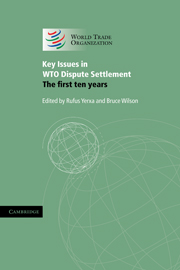Book contents
- Frontmatter
- Contents
- Notes on contributors
- Preface
- Table of cases
- Abbreviations
- PART I Introduction and General Considerations
- PART II The WTO Dispute Settlement System: Its Processes and Its Institutions
- PART III The WTO Dispute Settlement System: Systemic and Other Issues
- 12 The role of lawyers in the WTO dispute settlement system
- 13 Jurisdiction in WTO dispute settlement
- 14 Due process in WTO disputes
- 15 Standards of review in WTO panel proceedings
- 16 Administration of evidence in WTO dispute settlement proceedings
- 17 Confidentiality issues under the DSU: fact-finding process versus confidentiality
- 18 Panels' consultations with scientific experts
- 19 Amicus curiae participation in WTO dispute settlement: reflections on the past decade
- 20 Suspension of concessions and retaliation under the Agreement on Safeguards: the recent US – Steel Safeguards case
- 21 Compliance with WTO dispute settlement decisions: is there a crisis?
- 22 DSU review: a view from the inside
- PART IV Annexes
17 - Confidentiality issues under the DSU: fact-finding process versus confidentiality
from PART III - The WTO Dispute Settlement System: Systemic and Other Issues
Published online by Cambridge University Press: 04 August 2010
- Frontmatter
- Contents
- Notes on contributors
- Preface
- Table of cases
- Abbreviations
- PART I Introduction and General Considerations
- PART II The WTO Dispute Settlement System: Its Processes and Its Institutions
- PART III The WTO Dispute Settlement System: Systemic and Other Issues
- 12 The role of lawyers in the WTO dispute settlement system
- 13 Jurisdiction in WTO dispute settlement
- 14 Due process in WTO disputes
- 15 Standards of review in WTO panel proceedings
- 16 Administration of evidence in WTO dispute settlement proceedings
- 17 Confidentiality issues under the DSU: fact-finding process versus confidentiality
- 18 Panels' consultations with scientific experts
- 19 Amicus curiae participation in WTO dispute settlement: reflections on the past decade
- 20 Suspension of concessions and retaliation under the Agreement on Safeguards: the recent US – Steel Safeguards case
- 21 Compliance with WTO dispute settlement decisions: is there a crisis?
- 22 DSU review: a view from the inside
- PART IV Annexes
Summary
The Dispute Settlement Understanding (DSU) is one of the fundamental achievements of the Uruguay Round. The new dispute settlement system has been sometimes called the ‘crown jewel’ of the WTO. Indeed, the DSU modified the world trading system significantly, by offering a system of binding dispute settlement based on legal rules and procedures. Such a transformation was a welcome change from the diplomatically based dispute system under the GATT 1947, which was textually weak and seriously flawed.
According to Article 3.2 of the DSU the dispute settlement mechanism is the central element in providing security and predictability of the multilateral trading system. So far this efficient, predictable and reliable rules-based dispute system has been widely hailed as an improvement over the rules and procedures of the GATT, and has earned its appellation as a ‘crown jewel’.
Nevertheless, issues arose early on with regard to the need to improve the DSU. In this respect a review of the DSU (DSU review) had been provided by WTO Members at an early stage for completion by October 1998, which presented them with an opportunity to amend the rules regulating international trade disputes. However, despite numerous extensions of the deadlines, WTO Members have been unable to complete and conclude these negotiations up to now.
Among the issues within the DSU review process are, inter alia, the improvement of transparency of the dispute settlement system and the implementation process following WTO rulings.
- Type
- Chapter
- Information
- Key Issues in WTO Dispute SettlementThe First Ten Years, pp. 190 - 203Publisher: Cambridge University PressPrint publication year: 2005



